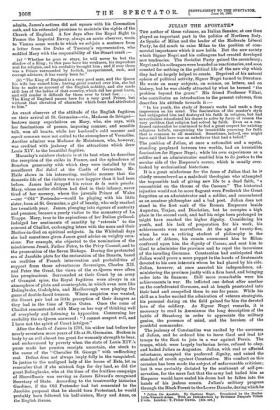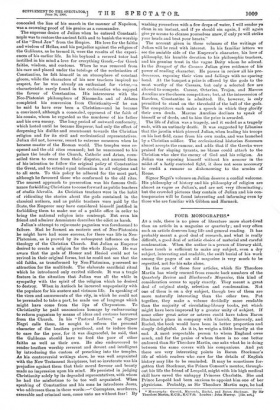JULIAN THE APOSTATE.*
THE author of these volumes, an Italian Senator, at one time played an important part in the politics of Northern Italy.
As Syndic of Milan and the leader of the Mdderate Liberal Party, he did much to raise Milan to the position of com- mercial importance which it now holds. But the new society which Signor Negri and his colleagues had created developed new tendencies. The Socialist Party gained the ascendency; Negri and his colleagues were branded as reactionaries, and soon counted for nothing in the political life of the new city which they had so largely helped to create. Deprived of his natural sphere of political activity, Signor Negri turned to literature.
He wrote on many subjects, on science, on letters, and on history, but he was chiefly attracted by what he termed " the problem beyond the grave." His friend Professor Villari, who contributes an introduction to the present volumes, thus describes his attitude towards it :-
" In his youth, the study of Renan's works had made a deep impression on his mind. The fascination of the master's style had subjugated him and destroyed his faith in religion, but had nevertheless stimulated his desire to solve by force of reason the very problem that religion had solved by faith. Even as a con- firmed rationalist he continued to feel a great respect for existing religious beliefs, recognising the irresistible yearning for faith that is common to all mankind. Sometimes, indeed, one might have said that here was an unbeliever that had a belief."
The position of Julian, at once a rationalist and a mystic, standing perplexed between two worlds, had an irresistible fascination for Signor Negri; while his own experiences as a soldier and an administrator enabled him to do justice to the secular side of the Emperor's career, which is usually over- looked by ecclesiastical historians.
It is a great misfortune for the fame of Julian that he is chiefly remembered as a maladroit theologian who 'attempted the impossible task of giving new life to a dead faith, " a romanticist on the throne of the Caesars." The historical injustice would not be more flagrant were Frederick the Great forgotten as an administrator and a soldier, and remembered as an amateur philosopher and a bad poet. Julian does not stand in the first rank of the Roman Emperors beside Augustus, Trajan, and Diocletian, but he occupies a high place in the second rank, and had his reign been prolonged he might have reached the higher dignity. Considering his youth, and his lack of preparation for his work, his achievements were marvellous. At the age of twenty-five, when he was a retiring student of philosophy in the schools of Athens, his cousin summoned him to Milan, conferred upon him the dignity of Caesar, and sent him to Gaul to administer the province and to repel the incursions of the invading Germans. Constantius had anticipated that Julian would prove a mere puppet in the hands of lieutenants devoted to his own interests whom he had placed by his side. Julian, however, at once asserted his independence, ad- ministering the province justly with a firm hand, and bringing order into its finances. Still more remarkable were his achievements in war. He inflicted one defeat after another on the confederated Germans, and at length penetrated into their land and compelled them to sue for peace. While his skill as a leader excited the admiration of veteran strategists, his personal daring on the field gained for him the devoted love of the soldiery. As Signor Negri remarks, it is necessary to read in Ammianus the long description of the battle of Strasburg in order to appreciate the military genius, the presence of mind, and the heroism of the youthful commander.
The jealousy of Constantine was excited by the successes of Julian, and he ordered him to leave Gaul and lead his troops to the East to join in a war against Persia. The troops, which were largely barbarian levies, refused to obey, and hailed Julian as Augustus. Julian, with real or affected reluctance, accepted the proferred dignity, and raised the standard of revolt against Constantins. His conduct on this occasion has been made the subject of unfavourable criticism; but it was probably dictated by the sentiment of self-pre- servation, for the mere fact that the army had hailed him as Emperor would have sealed his doom had he fallen into the hands of his jealous cousin. Julian's military progress through the Black Forest to the Lower Danube, during which he
• Julian the Apostate. By Gaetano Negri. Translated by the Ditches Litte.-Visoonti-Arese. With an Introduction by Professor Pasquale Villari 2 vols. London T. Fisher Ifnivin. 121s. net.]
concealed the line of his march in the manner of Napoleon, was a crowning proof of his genius as a commander.
The supreme desire of Julian when he entered Constanti- nople was to restore the ancient faith and to banish the worship of. the "Dead Jew" from the Empire. His love for the faiths and wisdom of Hellas, and his prejudice against the religion of the Galileans, as be termed it were the results of the experi- ences of his earlier life. In his boyhood a revered tutor had instilled in his mind a love for everything Greek,—for Greek faiths, wisdom, and customs. When he was removed from his care and placed under the tutelage of the ecclesiastics of Constantius, he felt himself in an atmosphere of constant gloom, while the characters of his new teachers inspired no respect, for he was already an enthusiast for virtue,—a characteristic rarely found in the ecclesiastics who enjoyed the favour of Constantius. His intercourse with the Neo-Platonist philosophers of Nicomedia and of Athens completed his conversion from Christianity—if he can be said to have ever been a Christian—and he became a convinced, although a concealed, opponent of the faith of his cousin, whom he regarded as the murderer of his father and his own enemy. The long period of outward conformity, which lasted until he became Emperor, had only the effect of deepening his dislike and resentment towards the Christian religion and for its civil and ecclesiastical representatives. Julian did not, however, resort to extreme measures when he became master of the Roman world. The temples were re- opened and the old rites resumed; but he summoned to his palace the beads of the Church, Catholic and Arian, coun- selled them to cease from their disputes, and assured them of his intention to follow the original policy of Constantine the Great, and to extend equal toleration to all religions and to all sects. To this policy he adhered for the most part, although be favoured those who conformed to the old rites. The nearest approach to persecution was his famous Ordi- nance forbidding Christians to come forward as public teachers of studia literalia. As Christian teachers were in the habit of ridiculing the stories about the gods contained in the classical authors, and as public teachers were paid by the State, the Emperor may have considered himself justified in forbidding them to make use of a public office in order to bring the national religion into contempt. But even his friend and admirer Ammianus describes the edict as harsh.
Julian's attempt to rejuvenate paganism was foredoomed to failure. Had he formed an esoteric sect of Neo-Platonists he might have had some success, for there was life in Neo- Platonism, as is proved by its subsequent influence on the theology of the Christian Church. But Julian as Emperor desired to create a religion for the whole Empire. He was aware that the gods of Homer and Hesiod could not be revived in their original forms, but he could not see that the old faiths, as transformed by Neo-Platonism, possessed no attraction for the multitude. The elaborate sacrificial ritual which he introduced only excited ridicule. It was a tragic feature in the situation that Julian was all the while in sympathy with the spirit of the religion which he desired to destroy. When in Antioch he incurred unpopularity with the populace for his austere and virtuous life. In speaking of the vices and amusements of the city, in which he could not be persuaded to take a part, be made use of language which might have come from the lips of Chrysostom. To Christianity he paid unconscious homage by endeavouring to reform paganism by means of ideas and customs borrowed from the Church. In his " Pastoral Letters," as Signor Negri calls them, he sought to reform the personal character of the heathen priesthood, and to induce them to care for the poor, for it was disgraceful, he said, that the Galileans should have to feed the poor of other faiths as well as their own. He also endeavoured to render heathen worship reverent and devout and intelligent by introducing the custom of preaching into the temples. As his controversial writings show, he was well acquainted with the New Testament Scriptures, but so inveterate was his prejudice against them that their moral fervour and beauty judging Christianity no impression upon his mind. He persisted in udging Christianity solely by its degraded representatives, with whom be had the misfortune to be too well acquainted. When speaking of Constantine and his sons he introduces Jesus, who addresses them in these words :—" Corrupters, murderers, execrable and criminal men, come unto me without fear ! By washing yourselves with a few drops of water, I will render ye clean in an instant, and if ye should sin again, I will again give ye means to cleanse yourselves anew, if only ye will strike your heads and beat your hearts."
The account given in these volumes of the writings of Julian will be read with interest. In his familiar letters we see the amiable side of the Emperor's character, his love of philosophy, his humble devotion to his philosophic teachers, and his genuine trust in the vague Deity whom he adored. In the Banquet of the Caesars Julian gives evidence of his power of reading character. He passes in review all his pre- decessors, exposing their vices and failings with no sparing band. At the banquet a prize is offered by the gods to the most worthy of the Caesars, but only a selected few are allowed to compete. Caesar, Octavius, Trojan, and Marcus Aurelius are the chosen competitors; but, at the intercession of Bacchus, Constantine is admitted. He, however, is only permitted to stand on the threshold of the hall of the gods. The competitors each make a speech in which they glorify their own deeds. Marcus Aurelius declines to speak of himself or of deeds, and to him the prize is awarded.
The life of Julian was a tragedy, and it ended as a tragedy ends, with an untimely death. It was suggested by Libanius that the javelin which pierced Julian, when leading his troops on his last field, came from his own ranks, and was launched by a Christian soldier. The ecclesiastical historian Sozomen almost accepts the rumour, and adds that if the Greeks were praised for slaying tyrants, no blame could attach to the Christian who slew the enemy of God and his religion. As Julian was exposing himself without his armour in the midst of a hotly contested fight, it does not seem necessary to credit a rumour so dishonouring to the armies of Rome.
Signor Negri's volumes on Julian deserve a cordial welcome. His philosophy of history and his philosophy of religion are almost as vague as Julian's, and are not very illuminating ; but the crowded pictures they contain of Julian and his con- temporaries will be found interesting and informing even by those who are familiar with Gibbon and Harnack.



























































 Previous page
Previous page